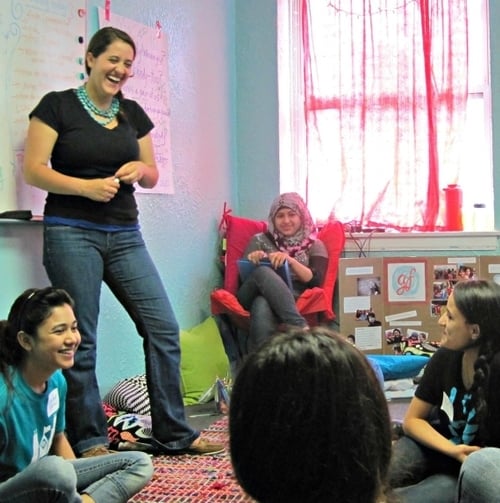-

Educator
Walter Payton College Prep High School
My story
For the first twenty years of my life, I did not want to be a teacher.
It seemed that teachers were people who knew all the answers: good at directing and disciplining, excellent at remembering facts and figures, organized arbiters of truth and wisdom. Initially, I was more excited about being a learner: collaborating with others, taking risks on new ideas, and letting curiosity lead education. After years of teaching, I’ve found that effective teachers are learners first—and that learning is a messy and imperfect process that centers embracing discomfort. I’m still working on it.
For the last twelve years, I’ve spent my time unlearning assumptions about my chosen career, and working with students and fellow educators to co-create learning environments that focus on equity through student agency, voice, and empowerment.
Education has taken me across the world. I managed an education enrichment program in New Zealand, taught ESL methods in Cuba, and led instruction for refugee girls through a nonprofit called GirlForward.
Education has also given me a home in Chicago. I now teach in CPS, and I’ve been fortunate to work as a member of the Transformative Teacher Cohort, the Teacher Advisory Council, the Framework Specialists, and the Instructional Equity Work Group.
Through this work, I strive to understand how teachers can be partners in a process of transformative learning with students. It turns out teaching is a whole lot more about learning than having all the answers. I look forward to continuing to connect with passionate others seeking to unlearn and build together.
Why I choose to engage in equity work
Throughout my time in education, I have grappled with one question: How can educators, administrators, and policymakers support students in actively accessing power both individually and systemically?
I believe in student empowerment through student voice.
When given access to supportive spaces and effective resources, students are able to transform their classrooms, their communities, and education as a whole. I’ve been lucky enough to witness it.
Five years ago, students in my class co-created curriculum to analyze systemic inequities in our school’s disciplinary system. From curating texts to setting objectives to organizing recommendations, students led learning and a shift in school-wide awareness.
Last year, students began to develop “Change Ideas” in our class. Students identified an issue in our school and the district based on data, developed a proposal for a solution, presented to our staff in professional development, and then implemented their solutions with the support of the Office of Equity and our administration.
These Change Ideas focused on cultural gaps between staff and students, inequity in tracking at our school, and the power of school exchanges to highlight and challenge inequity. Through their work, students altered the course of our school: entire course teams changed their curriculum and texts, AP alignment for all students became a focus, and student representatives were appointed to what were once adult-only leadership teams.
This equity and student voice work is happening across Chicago in many classrooms, but it can be lonely, isolated work if we don’t share it.
In the past year, my “why” has shifted to incorporate championing and connecting teachers who do this work. I have another essential question now: How can we acknowledge, support, and connect the network of teachers honoring and advocating for student voice in CPS?
So many do this work; I am grateful to be a part of it.
My equity challenge and how I work on it
Although students are the stakeholders in education, their voice and power is frequently not supported, acknowledged, or honored because of assumptions, biases, and stereotypes.
Research shows that teachers of color are more effective and more highly rated by students of all races. As a white educator, I am aware of this truth everyday. My privilege and my biases—implicit and explicit—require an intentional commitment to unlearning, a process that will extend throughout my lifetime.
I read, reflect, research, assess, and reflect again, but most essentially, I do the work. It’s imperfect work, but I keep on working.
Students deserve a voice in my imperfect work, of course.
As a teacher, I have students anonymously assess me quarterly using the Tripod/Gates Survey. Students assess my ability to Challenge, Confer, Consolidate, Care, Captivate, and showcase Cultural Competency. We go through the results together, and they provide feedback and pitch solutions for me to implement. I am imperfect, and my students know this.
Acknowledging our shortcomings as areas of potential growth is not only needed in the classroom, it’s a requirement of equity work.
What sustains me when equity work stalls, how do I stay motivated when the work gets hard, and how do I push myself and others to advance equity
The first piece is mindset. The work might stall, but our mindsets, our values, and our support systems don’t. Doing the work, for me, requires cultivating a strong mindset—internal work can sustain when the external doesn’t.
The second piece is community. Surrounding myself with other educators focused on equity work has both sustained me and challenged me, both in my school and at the district level. I have been lucky to have mentors that push my thinking, support my work and my development as a teacher leader.
My family is also committed to equity work in our personal lives and that drives me through encouragement, constructive critique, and love.
